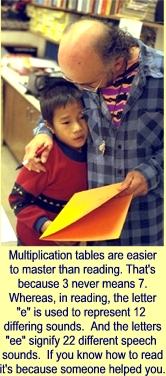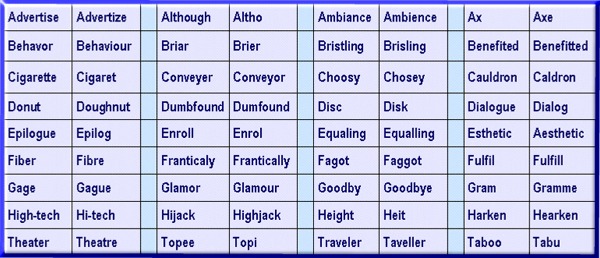
In Support of the Valiant Efforts of Those Who Teach Spelling.
Essay by Dr. Edward Lias
Wherever English is spoken there will be spelling classes for children and adults who are learning to write or read English words. Spelling has a primary place in the curriculum from kindergarten to sixth grade in most English-speaking countries and schools.
Not so in many other countries like Spain, Mexico, Germany, France and Russia where alphabets are used quite consistently to represent sounds. After Japanese and Chinese, English probably ranks as the third most difficult modern language to master.
English writing is an admixture of letter combinations where every desirable rule ("i" comes before "e" except - - -) has so many exceptions that there are practically no spelling rules. Computer programs attempted to analyze five million words to identify and state the "rules." It ended up with only one rule: there are no English words that end in "V." The word "OF" ought to end in a "V," but it doesn't.
 Since they don't have spelling classes in non-English language countries, those children have hundreds of hours freed-up to learn about science, math, social skills, history, and the arts. But as long as English remains codified as it is in modern dictionaries, teachers (maybe you) will continue to teach spelling as a school subject.
Since they don't have spelling classes in non-English language countries, those children have hundreds of hours freed-up to learn about science, math, social skills, history, and the arts. But as long as English remains codified as it is in modern dictionaries, teachers (maybe you) will continue to teach spelling as a school subject.
The teaching of spelling and the use of spelling books and spelling exercise sheets is a valuable activity (under the present circumstances) because it enables teachers to identify those learners who fail to grasp the idea of "sounding out" syllables, or they can reach out to students who don't understand that writing and reading is essential in our complex cultures.
Letters are what jump into pools of English words where they joyfully float around on water wings, independent and without supervision it seems. The letters must seem this way to young observers who're told they MUST make sense of the splish-splashing pool party called "English Spelling."
The difficulty of learning to spell English words is further handicapped by this strange fact: - hundreds of English words can be spelled two or three different ways - all approved by standard dictionaries.
Even though our eyes seem to jump directly to any misspelled word on a page, the definition of right and wrong spellings is quite arbitrary. Sometimes there are several correct spellings, other times variance is prohibited. Dictionaries differ widely on which spelling is "normal" and which is an accepted variant. Leafing through any four or five pages in a dictionary you'll find an example like this in the fine print "BRUNET (Also BRUNETTE)." Here are a few examples of variant spellings - out of about 1,000 such words:

Despite the strictness with which we judge writers who let writings go out with occasional misspelled words, and despite the reluctance to simplify spelling standards, still, the public accepts with no complaint the use of silly trade mark spelling distortions that greet us on grocery shelves and toy stores. Krazieee spellings are okay if they're on cereal boxes, hardware-store items, or computer ads.
To name a few, you've seen these: KWIK-SEAL, EVERBLUM, KLEEN-SWEEP, CUDL-BABY, ABLE-STIK, GRO-WELL, HI-POWER, LIPSTIK, NUWELD, TREET, IDEEL, U-HAUL, CITIBANK, QUIK-KOPY, POWR KORD, DOR GARD, DUNKIN DONUTS, and thousands more.
Actually English spelling may be evolving slowly toward simpler forms because computer e-mail and document processing packages enable groups small or large to invent their own simplifications and abbreviations. However, we still form negative opinions about people who habitually send out e-mail or writings with misspelled words throughout. Some people even ignore the spell checker and have no concern that each misspelled word is a guaranteed judgement against them.
Spelling teachers do provide a valuable and indispensable service to all persons who are learning to write and read. English will probably continue to be the world's most used language, so spelling teachers must continue to fulfill a vital function in the educational process.
To help enliven the teaching of spelling, the Internet has a number of sites offering services to spelling teachers.
Book: Stories in Reformed Spelling.
English's irrational spelling requires years to learn and doubles our illiteracy rate. This book explains the harms it does and shows how easy it is to read in a reformed spelling system. It allows you to read stories and whole novels in Reformed, just for curiosity. And it contains enough material in self-consistent Reformed, that you might use it to teach a struggling student to read.
Author and Editor: Robert A. Mole - President of the American Literacy Council.
Book: Understanding English Spelling by Masha Bell.
This book analyzes the regularities and irregularities of the English spelling system. Word lists in the book are useful for teachers and parents who are teaching reading and spelling. Persons interested in the improvement of English spelling will benefit because the book not only explains why English literacy acquisition is slow and difficult, but it shows which spellings are most detrimental to literacy progress and in most urgent need of repair. Available at Amazon.com by clicking above.
Book: Spelling Dearest
"Spelling Dearest" - The Down and Dirty, Nitty-Gritty History of English Spelling) by Niall McLeod Waldman is an irreverent tell-all book. It reveals why English spelling is so needlessly difficult. The crucial events, the intentional complexity, the downright blunders are all there including names and dates of those who caused our misery. This book is "pithy and profound." The New Orleans Times says, "it's an informative, free-flowing, humorous and historic look at how we screwed up so badly for so many years." Spelling Dearest takes a lighthearted stab at the weakest part of the written English language. Available at Amazon.com by clicking above.

Considering that we have twenty-two different combinations of letters that are supposed to signal the "EE" sound as in "FEET", and considering that those 22 pairs of letters are also used to represent a dozen other sounds in thousands of other words, we can be sure that the teaching of spelling - as the orthography now stands - will be a valued profession, presuming that we want children to learn to read.
The example on the left is a very small indicator of the problem. Lists like these are published elsewhere on this web site covering most of the other letters of the alphabet that are inserted here and there with arbitrary abandon.
Dumb shouldn't end with a "B" but it does. Stroke shouldn't end with an "E" but it does. Spelling shouldn't consume hundreds of hours of curriculum in grades one to five, but it does. Until simpler spelling standards are accepted someday, the teaching of English spelling will be necessary, desirable, in fact indispensable.
So to all spelling teachers out there in public or private schools, and to parents who provide home schooling, we should state loudly our sincere gratitude. It's not your fault that words are spelled with inconsistencies and irregularities. As long-time readers ourselves, some of us imagine that English anomalies are charming, part of our God-given heritage, equivalent with life, liberty, and happiness. But little children and adult English learners aren't so sure about that while they struggle and you patiently pass out more spelling sheets and tests.
Radio has no requirement that a certain level of noisy static must be maintained lest it become too easy to hear. Mathematics has no room for a single number that means a lot of different things sometimes. What if telephones had very loud background noises - required by law to purposely make it difficult to hear or speak - therefore requiring a school subject called "Telephone-hearing for beginners." That would lead to "Telephone-Hearing-Bees" - contests where winners would be chosen based on being able to hear perfectly above the loudest distracting background noises. Wouldn't that be absurd?
But currently the written form of English writing has a level of relentless raspy static that every child and adult learner has to overcome. If you can read this, it means a patience and kind long-forgotten spelling teacher held your hand while you puzzled over the arbitrary use of letters. Our teachers or parents shoved word lists in our faces until finally, encountering their absurd placements often enough, we caved in and accepted words as the dictionary requires. Thank you, Mr. or Ms. Spelling Teacher, wherever you are.
This essay commissioned by the American Literacy Council. http://AmericanLiteracy.com